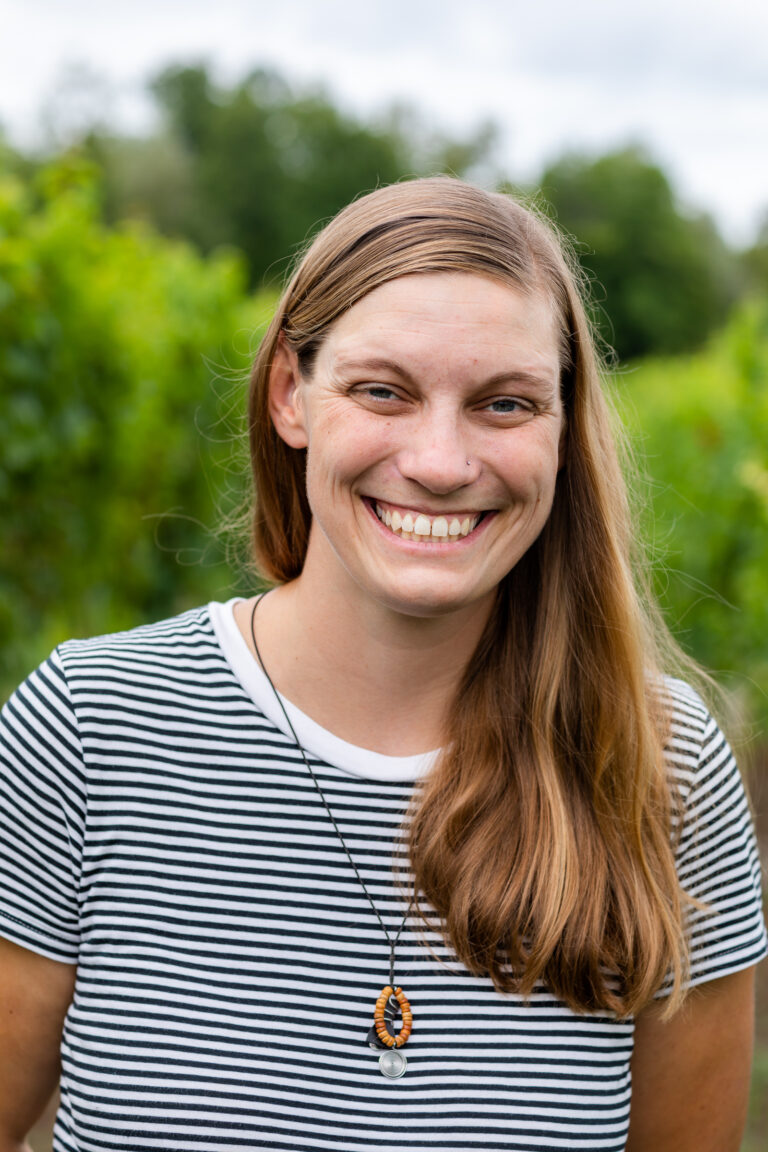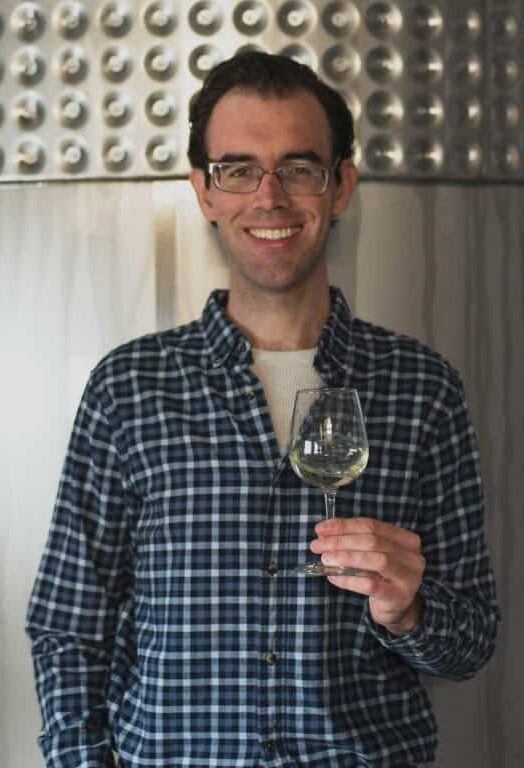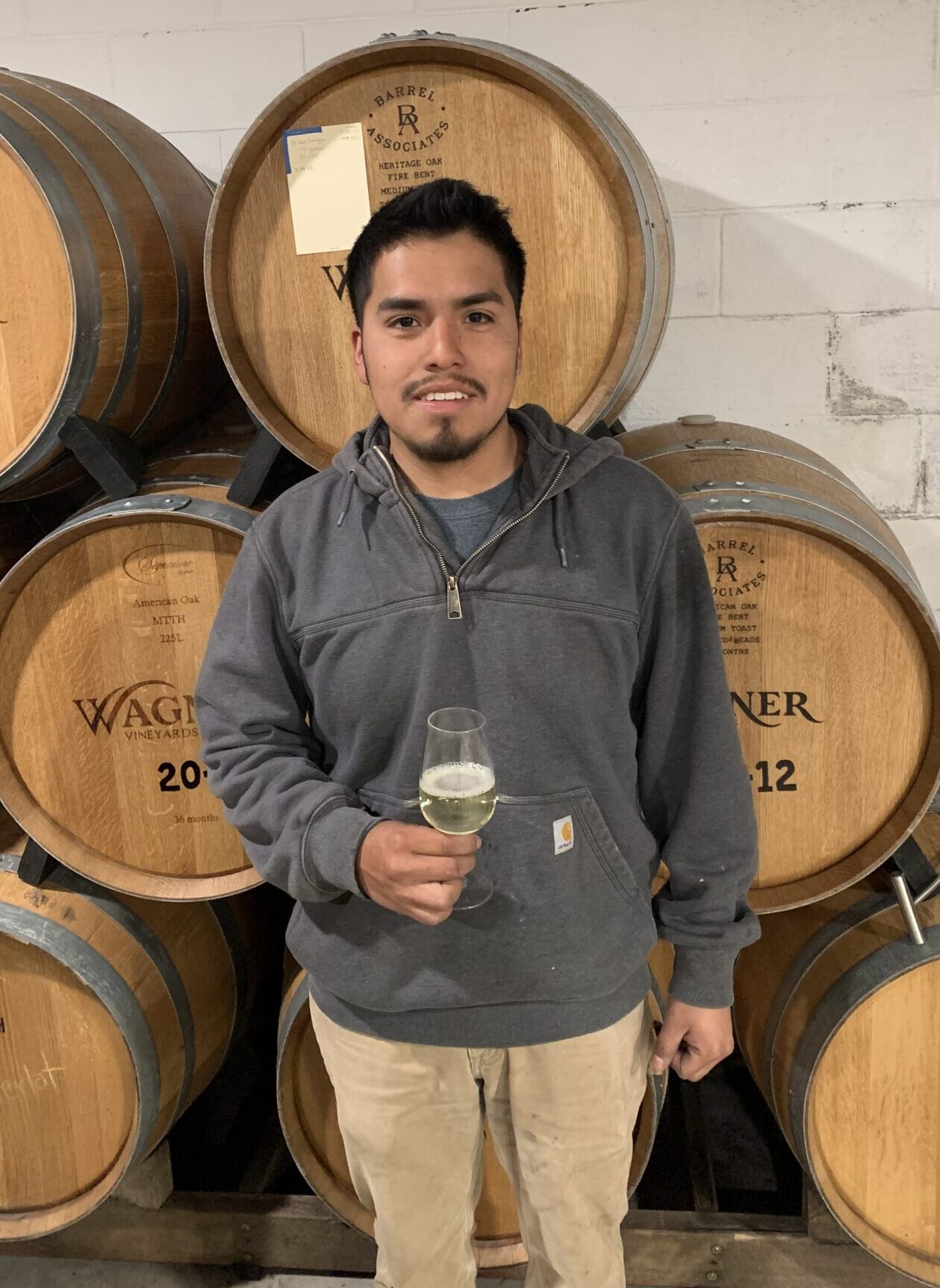When you make great wine, several elements—many beyond any one person’s control—must come together in a particularly auspicious way. Weather, climate and terroir have an outsize impact on the quality of a wine. But so do decidedly uncelebrated links in the winemaking chain. And by that we mean: interns.
In challenging winegrowing regions like the Finger Lakes, where the weather is more unpredictable and capricious than most other places, the often largely anonymous team of people making the wine behind the scenes has an even greater impact on the quality of the final product than they do in sunnier, friendlier climates.
According to winemakers, it’s often not a matter of formal training, or how much interns know that is most important—it’s their openness, attitude and way of thinking that matters most to the winemaker they work for, and their future career.
An ideal route to winemaking, after all, doesn’t exist—some people may enroll in enology school, others may train in their family’s cellar at a young age, still others end up working at wineries after leaving adjacent careers in restaurants, marketing or journalism. But one thing that every successful winemaker has in common is a serious, and largely thankless, stint in the cellar doing hard physical labor.
We reached out to winemakers and interns for their perspective on what it takes to become an incredible winemaker tomorrow, today.
Hosmer Winery’s Julia Hoyle Wants Inquisitive Interns

(Photo credit: Rima Brindamour)
Julia Hoyle, head winemaker at Ovid’s Hosmer Winery, took a circuitous route to the cellar.
“I studied French and Women’s Studies at Hobart and William Smith College, and I got a job at Fox Run’s tasting room,” Hoyle says. “I got bit by the wine bug, and started helping out on the bottling line. By the time I graduated, I knew a lot about the actual science of blending, filtration and making of wine.”
Hoyle realized after graduating that she couldn’t give up the cellar; but at the same time, she has zero regrets about not studying wine in college.
“You can learn the science of wine on the job,” she says. “As long as you’re inquisitive, curious and you’re not afraid of physical labor. Especially in New York, where you’re going to sometimes be wet and cold and outside for hours. The one thing everyone who wants to work in wine must do is get experience in the cellar and vineyard during harvest. The hours are long, the labor is intense, and you’ll either love it, or quickly realize it just isn’t for you.”
Before climbing the rungs to head winemaker at Hosmer, Hoyle put in time in the cellar at Fox Run, as an intern at Atwater Winery, an assistant winemaker at Sheldrake Point, and as a night shift white winemaker at South Australia’s Yalumba Winery. Hoyle says that in addition to looking for interns with inquisitive minds, she looks for interns who are willing to uproot themselves.
“I loved Australia, and I think that getting experience in different climates is essential when you’re starting out,” she says. “I always tell my interns that: try different places and see what you love. For me, it’s the Finger Lakes.”
Treleaven Winery’s Matt Denci Talks Attitude

(Photo: treleavenwines.com)
Treleaven Winery’s head winemaker Matt Denci thinks that the apprenticeship path in the winery, without formal training, may be ideally suited for New York’s unpredictable climate and (relatively speaking) small footprint.
“I definitely have gaps in my knowledge because I didn’t study wine undergrad,” Denci says. “But in a strange way, I think that benefits me here. We never know what the year is going to bring weather-wise, and because I don’t have a textbook approach to winemaking, I can come up with creative solutions on the fly that work, but might not make sense to classically trained winemakers.”
Like Hoyle, Denci graduated from a liberal arts program—in his case, as a History and Philosophy major at St. John’s—and realized quickly that being a cellar rat was much more conducive to his desired lifestyle than the more obvious career paths that presented themselves.
“I don’t know what this says about me, but when I graduated and thought about what I wanted from my life, the three things that came to me were, ‘pretty place, good food, good wine,’” he admits. A familial connection courtesy of his then-girlfriend landed him in Burgundy picking grapes at Domaine Dublere.
“Everything there was hand-harvested, so there was a team of interns, and we all connected and helped each other,” he says. The Burgundy gig led to a stint in New Zealand, then California, Australia and back to France. A visa snafu eventually led him to Red Newt in the Finger Lakes.
“Red Newt, because of its size, is probably the biggest talent pipeline in the Finger Lakes,” he says. “It’s such a small community, and because everyone is connected, we all help each other. The Finger Lakes is special. I think it may be the last major wine region in the U.S. where you can become a head winemaker through a series of cellar jobs and internships. You just have to work really, really hard and love it.”
And now that he’s head winemaker himself at Treleaven, that’s “just” what he’s looking for.
“I would prefer you to have experience of course, but it’s not the most important thing,” he says. “The question is, at 2 am after a 16-hour day, am I going to want to talk to you? Do you have a good attitude? Will you be enthusiastic?”
Wagner Vineyard’s Tito Chavez Says Get Your Hands Dirty

(Photo provided)
At Lodi’s Wagner Vineyards, working hard at the work that is hard gets an intern noticed, appreciated, and perhaps even hired.
“First and foremost,” according to Alex Jankowski, marketing manager at Wagner Vineyards, “a willingness to learn and a willingness to not do the glorious job” is what helps someone move ahead in the job.
“Show that the hard work is not a barrier,” he says.
When Wagner hired Tito Chavez as an intern from Finger Lakes Community College’s viticulture program, they found someone who had already been doing the hard work for years.
“My dad ran a crew of workers—still does with my brother—at just about every winery with a vineyard in Finger Lakes since I was 7. I grew up around it. I started helping out a lot with harvest and my interest peaked around age 16,” says Chavez.
“Wagner is one of the first vineyards my dad can remember working at so I thought it would be neat if I got more of my experience here,” he says. He did his required summer internship for his college program for Wagner, choosing to stay on through the fall to do a second internship.
“I got to experience the whole vineyard side leading up to harvest—I got the whole picture. Then I worked on the winemaking side that fall,” Chavez says. He showed the team at Wagner that he was willing to do the hard work.
“He’s extremely productive,” says Jankowski, “and we were confident to offer him a full time job.” At age 21, Chavez is now a vineyard associate at Wagner, helping out where needed in the vineyard and with winemaking.
His advice for anyone who aspires to work at a winery in the vineyards, the cellar, or both? Education helps, but hands on is essential.
“I learned more doing the hands-on work than anything else. School gives you science and background, but I think working hands on was more beneficial. I would recommend that you get your hands dirty,” he says.
Get ready to work hard, get your hands dirty, and have a good attitude. Sounds like stellar advice for advancing in the cellar … and in life.

